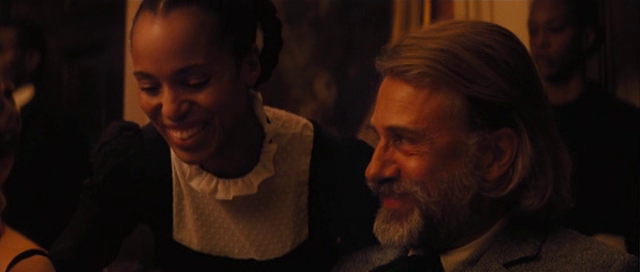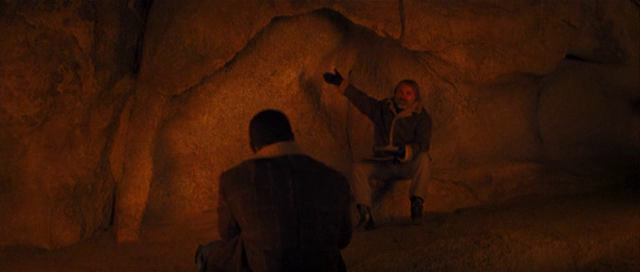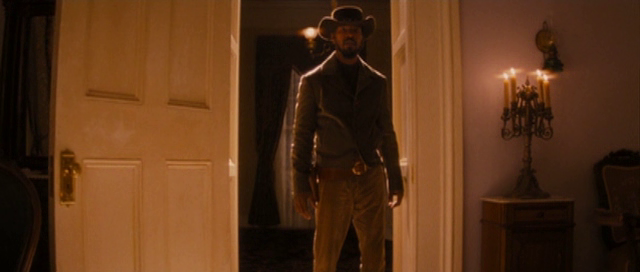
Django Unchained: “Jump at de sun.”
January 11th, 2013 by david brothers | Tags: Colored Commentary, django unchained, quentin tarantinoThe story of Icarus is one about obedience and hubris. “Be happy with what you have. Don’t fly too high and too close to the sun,” Daedalus said. Icarus, consumed with glee at being able to fly and escape his fate, ignores his father’s advice and pays the price.
In Dust Tracks on a Road, Zora Neale Hurston writes:
Mama exhorted her children at every opportunity to ‘jump at de sun.’ We might not land on the sun, but at least we would get off the ground.
I had to google around for the exact quote, but I knew it more or less already. “Things can only get better. Jump at the sun.”
Maybe it’s unfair to compare these two, but whatever. I like the contrast. Listen:
It’s hard for me to think of a quote that better defines the experience of being black in America. Growing up, I was taught that I’d have to work twice as hard to be heard, and deal with half the praise. Others would praise me more than my peers, simply because performing on par is exceptional when you start behind the eightball. Either way, I needed, need, to do more than my peers. I need to be better, faster, stronger, smarter, just so that I can be treated as normal instead of a niche.
America is short on black heroes. We don’t get to be the princes on white horses and princesses in high castles. When we are the king and queen, it’s in a creative work that people see as being specifically black, rather than mainstream. That’s “a black movie,” that one’s “a black comic.” It doesn’t get to be normal.
That’s how America works. White is the default. And once you begin changing up the formula — a black hero here, a spanish hero there — you move away from the default and become… niche.
What’s worse? Being invisible or being a curio?
One of my favorite aspects of Django Unchained is that it isn’t that black of a movie at all. It’s not a niche story. It’s a classic, an epic. It’s a story that we all know and love. There is a princess in a castle and there is a hero coming to save her. It’s a little different from damsel in distress tales — Hildi is thrown in the hotbox for trying to escape again, not for just trying to escape; she’s a troublemaker — but at its core? It’s the same. The difference? It stars a black man who loves a black woman, instead of a white man who loves a white woman.
Dr King Schultz tells the story of Siegfried and Brunhild to an attentive and eager Django not because it’s cute, or because Tarantino wanted you to know the end of the movie before it went down. Schultz, and Tarantino, relate that story to show just how universal this movie, a movie that tells the story of a freed slave trying to rescue his wife during one of the most dismal periods in American history, actually is.
Schultz even tells the story in the oldest possible way. He and Django are outside, sitting by a fire. While they eat, Django sits and listens while Schultz tells a story. Shadows flicker on the rocks behind them while they talk.
It’s the oldest story. It’s a love story. That’s what’s at the heart of it. There are revenge elements, but that isn’t what makes the story go. It’s about a man who will do anything to protect the woman he loves. When he finds out where his wife is and what she’s being forced to do, Django says something along the lines of “Not while I’m alive. Not while I have my gun.” We know that feeling. We know love.
Hildi is Django’s everything. His love for her is the engine that keeps him going, letting him push past the misery and horrors he has to indulge in. There’s no point in getting dirty if you don’t get to wash it off at the end of the day. Hildi is his salvation.
And he’s hers. They ran away together, they paid for it together, and after they were separated, she kept trying to get away. She’s no wilting flower. She’s a soldier. She’s going to run until they finally kill her, because freedom beats death every time. She’s willing to die for him, and he’ll die for her.
You don’t see a lot of these stories between black characters in big budget movies. Just a straight-up, no-nonsense, high profile love story. What was the last one? Independence Day? Men in Black? There’s probably been once since, there has to have been, but the fact that you’re wracking your brain right now says it all, if you think about it. It’s such a little thing, but you can feel that lack if you grow up and nobody like you gets to play in the big leagues.
I felt really, really good when I read this quote from Kerry Washington, from an interview with the LA Times:
“I know it’s not the most feminist idea to be a woman in a tower wanting to be rescued, but for a woman of color in this country, we’ve never been afforded that fairy tale because of how the black family was ripped apart [during slavery],” Washington said. “I really saw the value of having a story that empowers the African American man to do something chivalrous for the African American woman, because that hasn’t been an idea that has held women back in the culture — it’s something we’ve never been allowed to dream about.”
She said it better than I ever could. It feels good to finally get to be the prince, and I figure it feels good to finally get to be the princess, too. Damsel in distress stories might be passé to some people, but I bet those people never grew up wishing for fundamentally different skin or hair so that they could indulge in these fantasies.
I love that Django Unchained exists. I hate that it took this long for Hollywood to sit up, pay attention, and hook up a well-done picture that’s treated on par with any other big movie, despite the presence of a willing and clearly underserved black audience. Tyler Perry is a punchline, a cheap joke for internet types, instead of a model. “Nobody’s making movies for black grandmas? Well shoot son, I got these scripts right here…” We — everyone — should be part of the spectrum, part of “normal,” rather than an exception.
Until then, it’s twice as hard. Half the credit.
So why wouldn’t you jump at the sun?
Similar Posts:
- Django Unchained: “Coded language, man-made laws.”
- Django Unchained: “…if someone puts his hand on you, send him to the cemetery.”
- Django Unchained: “Negro from necro, meaning death: I overcame it so they named me after it.”
- Django Unchained: “Am I wrong ’cause I wanna get it on ’til I die?”
- Django Unchained: “I can’t pay no doctor bills (but Whitey’s on the moon).”




killing it
I love this whole series but this one… yes, yes, and yes. I read the interview with Washington before seeing the movie and couldn’t quite put it all in context (the “fairy tale” and how she talked about how emotional and draining filming the movie was). Once I walked out of the theater I said “Ok, now I get it.”
The “princess in the tower” bit was the hardest for my girlfriend to engage with. She compared that to Tarantino’s prior efforts with protagonist females (Jackie Brown, Kill Bill), and I get where she’s coming from. But it’s good to see Kerry Washington’s take on it as well.
Of course, the next step is a PG-13 version, so that little kids can watch it and go play Django at recess.
I want you to never stop writing about this film.
@Mojo: I’ve gotta make time for paying writing gigs, too 🙂
Home stretch, though. More to come.
David, these articles are wonderful. It’s really nice when something comes out that gets under your skin like Django, so I’m glad to be able to prolong my enjoyment of the movie longer. And yes, I’m having a hard time thinking of a big budget movie that featured a romance between a black man and black woman. The sad thing is you know there are only about 5 actors that could be in such a movie.
I’m glad you highlight the scene of Schultz telling the story of Siegfried and Brunhilde. I think it’s a crucial part of the film. Not only does it spell out that ‘Django’ is not a revenge story, but it’s another example of how important stories are to human culture. Ever since ‘Jackie Brown,’ Tarantino has been making movies about movies. ‘Kill Bill’ and ‘Death Proof’ are essentially homages to the types of films he enjoys, but ‘Inglorious Basterds’ and ‘Django’ focus on how movies affect individuals and culture. Film itself is weaponized in ‘Basterds,’ and the story of Siegfried is what motivates and inspires Django to go after his true love. It’s the oldest story there is, and King Schultz presents it as a form of “proto-cinema” with the shadows flickering behind him on the “silver screen” of the cave wall. Django has a goal in mind, all he needs is the narrative to inspire him.
These articles have been fantastic, and certainly given me a lot to think about. Thanks.
Lovely post, thank you. Even if I don’t agree with all of it!
It’s an interesting quote from Washington, but still disappointing for me, as a woman, to watch such a passive female character, especially after (as Professor’s Coldheart’s girlfriend pointed out) recent Tarantino characters like Jackie Brown, Beatrix Kiddo, Abernathy and Arlene, Shosanna Dreyfus and Bridget Van Hammersmark. It’s maybe refreshing if you’re desperate for straight-up fairytale scenarios, but even a lot of fairytales have heroines more intrepid than this. Did Hildy have to be SO passive? I mean, the fainting, and all?
I maybe wouldn’t have minded her passivity so much if QT had taken the trouble to give her decent dialogue, but can you remember a single word she said? She’s not even a character – she’s a plot device.
Thanks for this commentary, it made me enjoy the subtext of the movie at a level that, on my own, I wouldn’t have been able to.